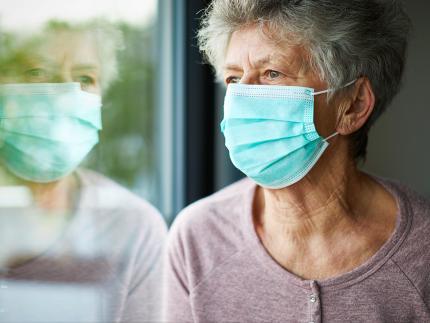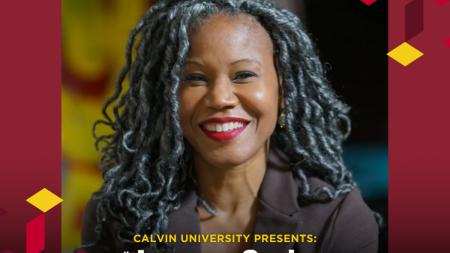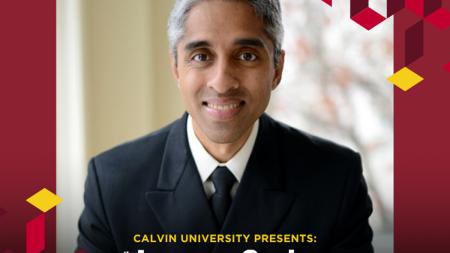Chaplains Help Seniors Through COVID-19

Richard Bodini is one of three chaplains at Holland Christian Homes (HCH) in Brampton, Ont. The three chaplains are also pastors on staff at Heritage Fellowship Christian Reformed Church (CRC) on the HCH campus.
Bodini pastored CRCs in Saskatoon, Sask., and in Newmarket, Ont., before starting his current role in October 2019—five months before the coronavirus hit metro Toronto. In this edited conversation, Bodini discusses senior faith formation during the pandemic.
Can you describe the Holland Christian Homes complex and demographics?
HCH was started in 1969 primarily for Christian seniors with Dutch and Reformed roots. The complex includes six towers of independent living apartments (where about half of the nearly 850 residents receive assisted living services) and two nursing care manors with 240 residents. The average age of residents across the entire complex is 87 years. In 2011, Heritage Fellowship CRC was formed specifically for HCH residents. Three HCH chaplains pastor the congregation as well as the whole complex. Henk Bruinsma and I are ordained in the CRC of North America, and Hank Blystra is ordained in the Reformed Church in America.
What's the overlap between HCH and Heritage Fellowship CRC?
Heritage Fellowship CRC (HFCRC) has about 260 active members, all HCH residents. Before the COVID-19 pandemic we worshiped together on Sunday mornings and evenings in a large hall that can hold 400 people on the main floor and 100 in the balcony. Some residents attend other local CRCs. Others are Canadian Reformed, United Reformed, Anglican, United, Presbyterian, Baptist, Roman Catholic, nondenominational, and non-Christian.
How has the coronavirus affected you as a chaplain and pastor?
For one thing, it's reminded me how often older people have been overlooked during the pandemic. If you don't think their lives are worth much, then you haven't sat down and talked with a senior. We never stop learning or growing in faith. Before the pandemic, over 250 residents were actively volunteering throughout the entire complex. They fed other residents, led devotions before meals, and led hymn sings and Bible studies. Even now, some volunteers are connecting through phone calls and hallway visits.
Despite the various shutdowns, health regulations, and restrictions, some HCH residents and staff have gotten the virus, and some have died. As chaplains, we were used to doing end-of-life visits in residents' apartments and conducting large funeral services at HFCRC. But with funerals and graveside services strictly limited to ten people, some families have been foregoing funerals. Some choose a private burial or cremation, and the family holds on to the urn. As the youngest chaplain here, I've taken responsibility for using social media technology to connect with residents, staff, and families.
How have you used technology differently for worship and other spiritual growth activities?
Church services have continued throughout the pandemic, broadcast on the HCH in-house television channel. They’re done without worshipers in the sanctuary.
Before COVID-19, we went into the manors to do a weekly hymn sing and a weekly Wednesday Bible study. The weekly Bible study—essentially a devotional teaching—in the manors would also serve as our communion service the week after communion in HFCRC, which we do about six times a year. During the pandemic we shifted Bible study and hymn sings to the inhouse television channel. We've had to adapt communion. Now we coordinate with the kitchen staff to have communion elements delivered to all who want to participate on communion Sundays, and we all celebrate at the same time. This has been a huge blessing for spouses who live apart in the complex (towers and manors). Family members outside the facility can also join through YouTube—so entire families are celebrating together a continent apart.
Can you share any stories about using technology for pastoral care?
Last April, I helped a family visit with their mom/oma [oma is Dutch for “grandma”] outside of Grace Manor. She was sick with COVID-19 and was not eating. The family made signs of encouragement. I helped them gather outside and facilitated a Zoom call with a staff member in the room so that the mom could see and hear her family outside. It took about an hour, but the mom was finally able to get a few drinks into her body and enough strength to be transferred out of bed and into her wheelchair. At the open window, she began waving to the family and stayed there for 25 minutes before returning to bed.
I've used Zoom and Facetime to pray with individual residents or do end-of-life video calls. On my phone, I can make my Bible have larger print or pull up a few lines of a hymn. I do that from my basement office in Hope Tower while a personal support or activity assistant holds both the phone or tablet and the resident's hand.
I remember one Faith Manor resident who had been such an advocate for people with disabilities. She was very ill with the virus. We'd arranged for her daughter and grandson to be outside her window so that she could see them and hear them on the phone. A 22-year-old activity coordinator was holding the phone and holding the woman's hand. The resident suddenly passed away during that video chat. It was very touching and very difficult.
Even when we can resume in-person pastoral care, I expect to continue using technology to create community with families who live far away or can't visit often.
What has kept you going despite pandemic stress?
By January 2021, I was exhausted. We had lost 24 residents from COVID-19 in five weeks, 80 other residents were infected, and almost 150 staff were sick. Morale was low, and I was called upon to pray and bring words of hope. For me, the psalms bring hope and joy. We three chaplains started doing weekday devotions when the pandemic began here in March 2020. Later we added two retired pastors to the rotation. We read Scripture, do a short devotion, pray, sing a hymn, and then give a benediction. I always use a psalm when leading a weekday devotion, so, in under three years, I will have worked my way through the Psalms.
We will continue using the Psalms after the pandemic ends. I’m not a musical person, so songs don’t come to me easily. Pictures and images do. Psalm 121 is huge for me: “To the hills I look, where does my help come from? My help comes from the Lord, the maker of heaven of earth.” As I walk to and from work each day, I arrive at the corner of Steeles Avenue and McLaughlin Road. Looking down Steeles, 28 kilometers to the west, I can see the Niagara Escarpment. “To the hills I lift my eyes. . . .” Every day as I look, cloudy or sunny, I praise and thank God for his faithfulness, love, mercy, and strength. I also gain strength from my fellow chaplains, HCH colleagues, and Facebook pages for chaplains and pastors.
What have you learned about faith formation among your congregation and other residents?
We never stop growing in faith. It's helpful to think about faith formation and life in thirds. Old age is the final third of life, and within it are three thirds. Early seniors are just retiring. Middle seniors realize they can't do as much as they used to. Maybe they experience some early dementia and no longer travel to warmer places for winter. Seniors in the final third are in decline or preparing to die soon.
So how do we continue to exercise their faith? It helps to recite the Lord's Prayer and the Apostles' Creed together. Well known Scripture texts seem to activate the Holy Spirit in seniors—not that the Spirit is ever absent from them.
What can congregations and continuous care facilities learn from your experience?
Dementia brings a whole different view to how one conducts worship and preaches. Shorter is better. Repetition is key from week to week. Establishing patterns and key phrases is a huge blessing. Known songs help seniors remember their salvation more than new songs do.
It's really important to know a resident's faith background and their diet of hymns in younger years. This is the faith life that's real for them, whether the song is in German, Dutch, or English. Some residents who no longer speak will nevertheless sing in Dutch. During a hymn sing, you see how a golden oldie makes heads pop up. When the song ends, eyes close.
Songs that especially get a response here are "I Come to the Garden Alone," "This Is My Father's World," "How Great Thou Art," and "Amazing Grace." Most of these folks sing from memory. The hymns and songs they learned as a child and an adult before dementia can be triggered when the “original” tune is played. These are the words that remind them of God’s faithfulness and reignite faith, hope, and assurance of salvation.


